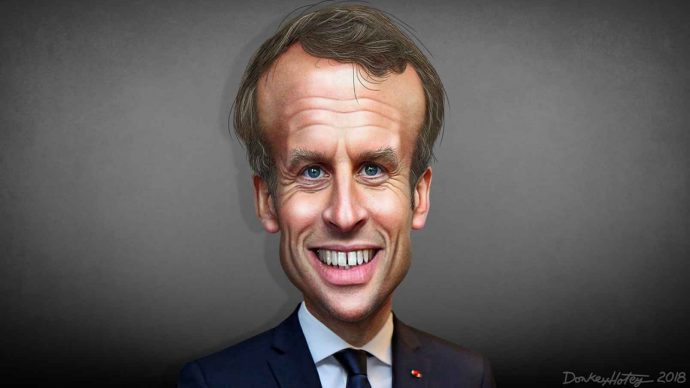Here is Bruce Thornton on Europe’s resentment of the U.S.:
He just refuses to tolerate its arrogant elites.
Speaking in Paris at the centenary of the Armistice, French president Emmanuel Macron (caricatured above) made some silly comments about nationalism. Recycling tired clichés about nationalism’s guilt for both World Wars, he called nationalism the “betrayal of patriotism” and warned about the “old demons coming back to wreak chaos and death.”
Apart from the ideological prejudices and historical ignorance on display from a globalist watching the “rules-based international order” tottering even as he speaks, Macron was also aiming his barbs at President Trump, who identifies himself as a proud nationalist. Macron punctuated his point by later calling for the creation of an “EU army” because “We have to protect ourselves with respect to China, Russia and even the United States of America.”
For NeverTrump globalists from both parties, a scolding from a European, even one accompanied by preposterous threats, is the QED of their indictment of Trump’s numerous offenses. But contrary to such naïve admiration, long before Donald Trump, the European ruling elite, especially the French, have looked on the U.S. with resentment, contempt, and envy.
The history of just the last 27 years illustrates how little Trump has to do with European attitudes towards America. By the time of the collapse of the Soviet Union in 1991, Europe and its dreams of ever-closer integration into a larger transnational federation was a few years away. Suddenly there was geopolitical space for a new “superpower” freed from the old Cold War strictures. Though belonging to NATO and a committed ally of the U.S., increasingly by the early 90s the European elite often appeared to comprise a “non-aligned” movement committed to peace and global development. It also was open to transcending the old, Manichean communist-capitalist dichotomy that had long fretted European communists and socialists, not to mention more recent leftist parties like the Greens.
Read more: Front Page Mag
Image credit: www.frontpagemag.com.

